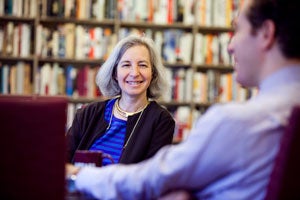In a recent interview with the Harvard Gazette, Harvard Law School Dean Martha Minow and Professor Noah Feldman surveyed the future of the Supreme Court in light of the succession of retired associate justice John Paul Stevens by former HLS Dean Elena Kagan ’86.
Minow and Feldman discussed the upcoming judicial year, reflecting on the change in dynamic that will necessarily result with the changing of the guard. Referring to recent and upcoming Court cases, they discussed prevalent themes such as free speech, national security, and copyright, and pointed to extra-judicial issues such as Congressional partisanship and the same-sex marriage case in California (Proposition 8) as events which may yield unintended effects on the future direction of the Court.
The Supreme Court’s new dynamic
Law School leaders gauge debut of former colleague Elena Kagan, and the import of upcoming cases
GAZETTE: Let’s begin by talking about the newest member of the court.
FELDMAN: In whose recently past office we sit.
GAZETTE: Exactly. Now that she’s about to start in her new role, how do you think she will change the dynamic on the court?
MINOW: I think she will change the dynamic on the court, but its actual direction we won’t know for several years. It’s also true that not only is she present, but Justice [John Paul] Stevens is absent, and so those are two major changes all at once. The consequence of that, we know immediately, will be relevant to conference discussions, also relevant to the assignment of opinions. She will not step into the role that he had because he was senior. On the other hand, she has terrific relationships with members on the court. She has gifts that we know firsthand: gifts of persuasion and knowing when to listen and when to speak. That’s why I say she will have a big influence, but we may not see it this year.
FELDMAN: There’s also a quirk, which is that because she was previously solicitor general, she can’t sit on a large number of cases. This really matters a lot because there are an odd number of justices. If you subtract one, you get a split court, and this court is often deeply divided on very controversial issues.
MINOW: In talking about Justice Kagan, it’s hard to restrict ourselves to this term because she’ll be there, we hope, for decades. This term will be an anomaly in terms of the small number of cases that she’ll actually be able to vote on.
GAZETTE: I wanted to step back for a moment to Commencement, when retired Justice David Souter offered a rather remarkable address. He contrasted the views of jurists who follow what he called the “fair reading” model with a judicial philosophy that requires justices to bring contemporary values to bear on constitutional questions before the court. How can his remarks inform casual court observers — people who just follow the workings of the court in the daily newspaper or on TV?
MINOW: Let’s look to the former Souter clerk. …
